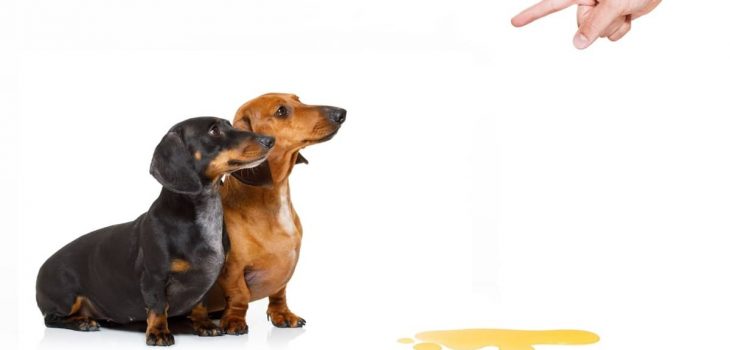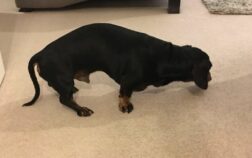Getting through the puppy peeing phase is a huge success for any dog owner but do you know how to stop an older dog from peeing in the house? It’s a problem you probably never thought you’d have to deal with but it’s not uncommon for older dogs to start having incontinence issues all of a sudden.
So, below we’ll go through the several possible causes of dog incontinence, as well as the solutions you may want to look into. And, if all else fails, you should also know how to manage the problem if it can’t be fixed.
How To Stop An Older Dog From Peeing In The House?
The first step to stopping the problem is identifying its cause. We all know why young pups pee everywhere – they don’t know better and are yet to be house trained. Older dogs don’t pee everywhere because they want to, however, they do so because they can’t help themselves.
The main reasons for the incontinence of older dogs fall into two categories – physical ailments and emotional distress. Sometimes such issues can be solved but other times you just have to live with them. Either way, if you want to help your dog and yourself, you’ll need to get your pooch to the vet as soon as you notice the problem.

Learn more about: Can Dogs Drink Grape Juice Or Is It A Bad Idea?
The 6 Main Physical Reasons For A Senior Dog Urinating In House
To figure out how to stop an older dog from peeing in the house, you should see what the problem is. The most common physical causes of the problem are the following 6:
- Urinary tract infection (UTI). This can happen to dogs of all ages but is especially common in older dogs. It can lead to several physical problems but it crucially always leads to a more frequent need for urination. So, when your dog suddenly gets the urge to pee 2x or 3x times more often, some accidents at home are bound to happen. Fortunately, the problem is fixable with a simple course of antibiotics. Of course, you should consult with your vet about that.
- Kidney infection. A similar but much more serious problem, kidney infections can also lead to frequent urination. However, they can also lead to a lot of other problems so you should view the accidental urination as a symptom and not as the main issue. If you leave a kidney infection unchecked for even just a while you can expect to see a lot of other issues pop up, some of which – potentially deadly.
- Hormonal changes. These are most often seen in elderly female sprayed dogs. The hormone in question is usually estrogen but there are a few other possible culprits. These changes can often lead to accidental urination as well as other issues such as thyroid dysfunction.
- Declining cognitive function. This is an unfortunate problem and it’s similar to a lot of cognitive issues in people such as Alzheimer’s and dementia. Simply put – sometimes your older dog may just be forgetting where he’s supposed to pee.
- Neurological conditions. These can include seizures, degenerative diseases, autoimmune diseases, tumors, strokes, and more. All of those can cause behavioral changes, including peeing in the house.
- Kidney disease, diabetes, Cushing’s disease. We group this up because all three of them cause your dog to require more water. This, in turn, means more frequent urination. So, if you don’t give your dog enough time outdoors to do his business there, peeing in the house may become unavoidable.
3 Emotional/Psychological Reasons For An Older Dog Peeing Inside
Sometimes, dogs can start peeing all over the place for purely psychological problems. The 3 most common ones usually include:
- Territorial issues. If you’ve decided to bring a new dog, pet, or even a child in your home, a senior dog can easily feel the urge to mark his territory. This is possible with mid-aged dogs a well.
- Stress or anxiety. This is a very common problem for a lot of dogs, especially when they get older. A dog can easily get stressed by a recent move into a new home, the passing away of a loved one (be it a human or another pet), or the introduction of a new family member. Physical discomfort and diseases can also cause stress that’s strong enough to lead to urinary incontinence.
- Protest to a routine change. Dogs are much more adaptable to change than cats and other pets but senior dogs are often intolerant to changes. If you try to switch the feeding or daily walk routine of a senior dog, it’s very possible that the response will be a “peeing protest”.
How To Manage An Old Dog Peeing A Lot Indoors?
With all nine of the possible causes above, there’s just one answer on how to stop an older dog from peeing in the house – get him to the vet. If the problem is treatable, the vet will know what to do. Getting rid of the root causes will deal with the peeing problem too in almost all cases.
Unfortunately, some of the core issues aren’t always treatable. In those cases, the peeing side effect may be something you’ll have to accept and try to manage instead. You can try and get a better handle on your dog’s peeing problem with any of the following tools:
- Get a pet loo for your dog to pee on at home.
- Dog belly bands or diaper pads can help deal with accidental urination.
- Dog blanket pads can be used to cover your furniture and absorb accidental urination.
Read more about Dachshund Age In Human Years – How Old Is Your Doxie Really?
In Conclusion – How To Stop An Older Dog From Peeing In The House?
The short answer is that either a vet will be able to help you or you’re going to need to help yourself by managing your dog’s problem better. This is an unfortunate reality of old age in dogs but it’s perfectly normal. After all, humans experience all sorts of unfortunate problems when we get into old age as well.




